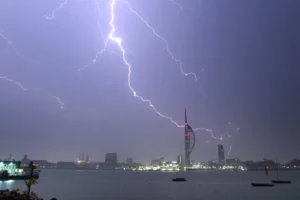For The Beatles it must have been a hard day’s night, but such was Dalek-mania, the robot mutants helped Doctor Who exterminate the Fab Four in one of the first major TV ratings battles.
Beatlemania was just kicking in and the 1960s were in full swing, yet it was The Doctor and his nemesis the Daleks on top of the 1964 Christmas TV charts.
Now as The Doctor prepares for a 60th birthday, many feel those Daleks are behind his record-breaking longevity.
Some say they even saved the doctor.
“Doctor Who was in very strong danger of being cancelled just weeks after it started,” recalled cultural historian Alwyn Turner.
But one wannabe comedian conjured up a fictional extra-terrestrial race of xenophobic mutants who saved the show from early extermination – and within a year of the first episode in 1963, Doctor Who was big enough to take on The Beatles.
“Doctor Who was originally scheduled to run for 52 weeks but after the first storyline, viewing figures were lower than expected,” said Turner.

“Many had the knives out, thinking ‘this isn’t going to last the 52 weeks, let alone the 60 years’.”
What saved the show was comedy writer Terry Nation, who had worked with comic legends like Spike Milligan, Eric Sykes and Tony Hancock – and prescribed what the doctor ordered by accident.
“Nation created the second storyline about the first Daleks in a bit of a rush,” said Turner, author of The Man Who Invented the Daleks: The Strange Worlds of Terry Nation.
“It wasn’t going to be his greatest work, this was just to keep him going between comedy writing jobs – surprisingly it was hugely successful, audience figures doubled and Doctor Who’s future was assured.”
The Daleks v The Beatles
The Daleks didn’t just help the doctor become a television institution but these hate-fuelled robotic beings were part of a British cultural revolution in the 1960s when Britannia was cool.
“Their first storyline makes them massive but at the end, the Daleks are destroyed and never supposed to reappear – but the public demanded they came back,” said Turner.

“They returned in Christmas 1964 when The Beatles were huge in America and popular culture centred around Britain. The Daleks were part of that and entwined with swinging London.
“The Daleks were so big that for their first episode back on a Saturday before Christmas in 1964, ITV put on a special with The Beatles to try and take the audience because they knew the Daleks would dominate the ratings.
“Doctor Who got bigger viewing figures than The Beatles – so for a brief moment, the Daleks and Dalekmania was bigger than The Beatles and Beatlemania.”
They clearly did not have the same lasting cultural impact, but he said “there was just this moment where the Daleks dominated”.

The Beatles went on to become arguably the greatest band of all time while Doctor Who, with a little help from his enemies, is in the Guinness Book of Records as the world’s longest running sci-fi TV series.
Now six decades later, The Beatles are back top of the UK singles chart and Doctor Who’s 60th anniversary blockbuster on Saturday is one of the most highly anticipated TV shows of 2023.
But they were briefly in danger of not returning with the Time lord when Doctor Who was rebooted in 2005 by Nation’s fellow Welshman Russell T Davies – and scriptwriters even wrote episodes without Daleks just in case.
“There was again public outcry as you cannot have Doctor Who without the Daleks,” said Turner, senior history lecturer at University of Chichester.

“The Daleks are intrinsic to Doctor Who and have a status that is almost higher than The Doctor himself.”
The reason why Daleks may not have returned in the reboot is because copyright to the likeness and characters of the Daleks are owned by Nation.
He died of emphysema in 1997 so now his estate jointly share their rights with the BBC in an unusual deal that made him a multi-millionaire.

“When the Doctor Who contract arrived from the BBC, Terry Nation was at a comedy agency and its secretary Beryl Vertue, who became a powerful television executive, crossed out the clause that said the BBC would own the rights to the Daleks,” said Turner.
“Nobody thought it mattered because Doctor Who was, at that time, a poor-performing little kids TV show.
“But then it exploded, the Daleks became massive and toy manufacturers came to the BBC asking to use the Daleks and the BBC realised they didn’t have a contract about who owned the rights.
“So they came to an agreement with Terry Nation that it would be split 50/50 and he became a millionaire and the BBC makes sure that every contract thereafter, they will keep the rights to their creations.

“Terry Nation made very little money out of writing for Doctor Who, but made a killing on the merchandise – and it was purely accidental.”
Who is Terry Nation?
Nation, an only child from the Llandaff area of Cardiff, initially did stand-up comedy and moved to London in his 20s. He joined Associated London Scripts, where he worked writing comedy for comic greats like Milligan, Sykes, Frankie Howerd and Hancock.
He had previously shown interest in science fiction so was invited to write seven episodes for Doctor Who in 1963 just after parting ways with Hancock after a falling-out.

“So in desperation he took that up but did it in a rush when another gig came in writing jokes for Eric Sykes,” added Turner. “That was more important for him so he had to get Doctor Who out of the way as quick as possible.
“He wrote an episode a day for a week and sent it to the BBC and forgot all about it – as it turned out, it became so big that changed his life and saved Doctor Who and turned it into a huge part of the UK’s shared culture.”
What are the Daleks?
To some they are funny-looking chunky robots who chant exterminate in a mechanical voice and have arms like a sink plunger, but many children across the UK – and today across the globe – fell for the petrifying and menacing charm of the Daleks.
“The Daleks are essentially the Nazis transformed into robots with a stiff-armed salute and insistence on exterminating the human race and all other races,” said Turner.

“The Dalek story in the Christmas of 1964 even talks about the final solution. It tapped into fears many people in the UK had at that time.
“The most important thing about the Daleks is that they do not have a human form. Previous TV robots had been based on a human shape but Nation’s great contribution is they don’t have legs, they glide across the stage and feel incredibly alien – that was powerful.”
Nation’s Daleks inspiration – later designed by Raymond Cusick – came from watching a dance troupe on TV as their long skirts gave the illusion they had no legs.
One thought is the name Dalek was inspired by Welsh author Roald Dahl, who lived 100 yards away from Nation in Cardiff, who had released James and the Giant Peach in 1961.

Whatever the reason behind the name, the Daleks are instantly recognisable and have become part of British heritage.
“There are lots of other monsters in the Doctor Who early days but the Daleks were the one that really captured the imagination of children,” said Tom Spilsbury, former editor of Doctor Who Magazine.
“We’d not seen anything quite like it before and while they were scary, kids loved them and they were so easy to imitate on the playground.”

Doctor Who was among the first sci-fi super franchise before the huge American blockbusters Star Trek and Star Wars and despite not having Hollywood budget special effects, the Daleks have helped Doctor Who stand the test of time.
“Every goodie needs a good baddie and the Daleks are the ultimate,” said Doctor Who superfan Endaf Evans, 52.
“The Jedis in Star Wars have the stormtroopers from the dark side but the Daleks are the original nemesis – and without them, Doctor Who wouldn’t have lasted this long.”
Nation’s fellow Welshman Russell T Davies added the technical wizardry and brought The Doctor into the 21st Century when rebooting TV show from Nation’s Cardiff in 2005 – and his impact remains.

“Doctor Who wouldn’t have survived without the Daleks and nobody would have remembered it,” added Turner.
“It’s the one aspect of Doctor Who that everybody knows – you don’t need to have seen a single minute of Doctor Who to know who the Daleks are.
“Terry Nation saved Doctor Who and Doctor Who kind of saved Terry Nation and made him into a very wealthy and successful man.”
Source : BBC
















